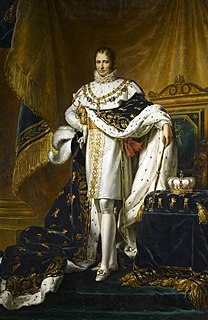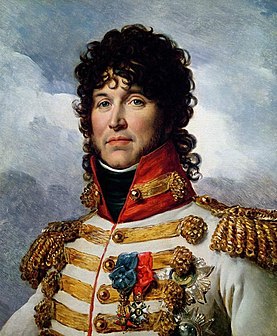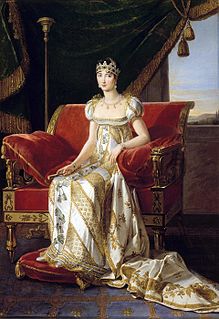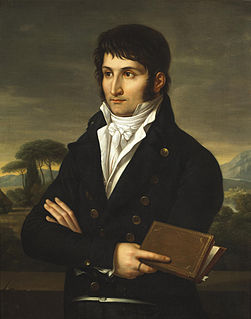
The House of Bonaparte was an imperial and royal European dynasty of Italian origin. It was founded in 1804 by Napoleon I, the son of Genoese nobleman Carlo Buonaparte. Napoleon was a French military leader who had risen to power during the French Revolution and who in 1804 transformed the First French Republic into the First French Empire, five years after his coup d'état of November 1799. Napoleon turned the Grande Armée against every major European power and dominated continental Europe through a series of military victories during the Napoleonic Wars. He installed members of his family on the thrones of client states, extending the power of the dynasty.

Joseph-Napoléon Bonaparte, born Giuseppe di Buonaparte was a French diplomat and nobleman, the older brother of Napoleon Bonaparte, who made him King of Naples and Sicily, and later King of Spain. After the fall of Napoleon, Joseph styled himself Comte de Survilliers.

Napoleon III was the first elected President of France from 1848 to 1852. When he could not constitutionally be re-elected, he seized power in 1851 and became the Emperor of the French from 1852 to 1870. He founded the Second French Empire and was its only emperor until the defeat of the French army and his capture by Prussia and its allies in the Franco-Prussian War in 1870. He worked to modernize the French economy, rebuilt the center of Paris, expanded the overseas empire, and engaged in the Crimean War and the war for Italian unification. After his defeat and downfall he went into exile and died in England in 1873.

Napoléon Bonaparte was a French statesman and military leader who rose to prominence during the French Revolution and led several successful campaigns during the French Revolutionary Wars. He was Emperor of the French as Napoleon I from 1804 until 1814 and again briefly in 1815 during the Hundred Days. Napoleon dominated European and global affairs for more than a decade while leading France against a series of coalitions in the Napoleonic Wars. He won most of these wars and the vast majority of his battles, building a large empire that ruled over much of continental Europe before its final collapse in 1815. He is considered one of the greatest commanders in history, and his wars and campaigns are studied at military schools worldwide. Napoleon's political and cultural legacy has endured as one of the most celebrated and controversial leaders in human history.

Joachim-Napoléon Murat was a Marshal of France and Admiral of France under the reign of Napoleon. He was also the 1st Prince Murat, Grand Duke of Berg from 1806 to 1808, and King of Naples from 1808 to 1815. Murat received his titles in part by being Napoleon's brother-in-law through marriage to his younger sister, Caroline Bonaparte, as well as personal merit. He was noted as a daring, brave, and charismatic cavalry officer as well as a flamboyant dresser, for which he was known as "the Dandy King".

Charles Lucien Jules Laurent Bonaparte, 2nd Prince of Canino and Musignano, was a French biologist and ornithologist. Lucien and his wife had twelve children, including Cardinal Lucien Bonaparte.

The Coup of 18 Brumaire brought General Napoleon Bonaparte to power as First Consul of France and in the view of most historians ended the French Revolution. This bloodless coup d'état overthrew the Directory, replacing it with the French Consulate. This occurred on 9 November 1799, which was 18 Brumaire, Year VIII under the French Republican Calendar.

The Council of Five Hundred, or simply the Five Hundred, was the lower house of the legislature of France under the Constitution of the Year III. It existed during the period commonly known as the Directory (Directoire), from 26 October 1795 until 9 November 1799: roughly the second half of the period generally referred to as the French Revolution.

Pauline Bonaparte was an Italian noblewoman, the first sovereign Duchess of Guastalla in Italy, an imperial French Princess and the Princess consort of Sulmona and Rossano. She was the sixth child of Letizia Ramolino and Carlo Buonaparte, Corsica's representative to the court of King Louis XVI of France. Her elder brother, Napoleon, was the first Emperor of the French. She married Charles Leclerc, a French general, a union ended by his death in 1802. Later, she married Camillo Borghese, 6th Prince of Sulmona. Her only child, Dermide Leclerc, born from her first marriage, died in childhood. She was the only Bonaparte sibling to visit Napoleon in exile on his principality, Elba.

Nob. Carlo Maria Buonaparte or Carlo Maria di Buonaparte was an Genoese lawyer and diplomat who is best known as the father of Napoleon Bonaparte.

Lucien Louis Joseph Napoléon Bonaparte, 4th Prince of Canino and Musignano, was a French cardinal.

Zénaïde Laetitia Julie Bonaparte, Princess of Canino and Musignano was the elder daughter of Joseph Bonaparte and Julie Clary, and the wife of Charles Lucien Bonaparte, who was also her cousin. She joined her father in exile for several years in Bordentown, New Jersey.

Napoléon Charles Bonaparte, 5th Prince of Canino and Musignano, was born in Rome as the son of Charles Lucien Bonaparte and his wife, Zénaïde Bonaparte.

The Princes of Canino and Musignano formed the genealogically senior line of the Bonaparte family following the death of Joseph Bonaparte in 1844. The line was founded by one of Emperor Napoleon's younger brothers, Lucien Bonaparte. It became extinct in the male line in 1924. The dynastic Bonapartist pretenders descend in the male line from Prince Jérôme Napoléon, Napoleon's youngest brother.

Prince Roland Napoléon Bonaparte was a French prince and president of the Société de Géographie from 1910 until his death. He was the last direct descendant of Lucien Bonaparte, the genetically senior branch of the family since 1844.

The First French Empire, officially the French Empire, was the empire of Napoleon Bonaparte of France and the dominant power in much of continental Europe at the beginning of the 19th century. Although France had already established an overseas colonial empire beginning in the 17th century, the French state had remained a kingdom under the Bourbons and a republic after the Revolution. Historians refer to Napoleon's regime as the First Empire to distinguish it from the restorationist Second Empire (1852–1870) ruled by his nephew as Napoleon III.

Charlotte Bonaparte Gabrielli was a French Napoleonic princess and the eldest daughter of Lucien Bonaparte and Christine Boyer. She became princess Gabrielli following her marriage to Mario Gabrielli, prince of Prossedi and Roccasecca, duke of Pisterzo. In Italy, she was known as Carlotta.
Dermide Louis Napoléon Leclerc was the only child of Pauline Bonaparte and her husband, French Army general Charles Leclerc. Through his mother, Dermide was a nephew of the future Emperor Napoleon I.

















